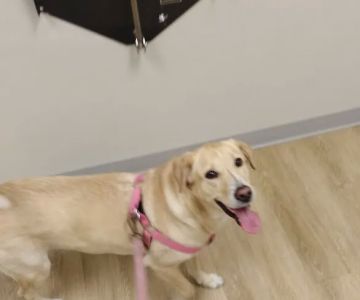Low-Calorie Diets for Overweight Pets: A Comprehensive Guide
As a pet owner, one of the most concerning issues you may face is your pet being overweight or obese. Just like humans, pets can suffer from the adverse effects of carrying excess weight, which can lead to health issues such as diabetes, heart disease, and joint problems. When I first noticed my cat gaining weight, I realized that it was time to take action. After doing some research and consulting with a vet, I found that a low-calorie diet could be the key to helping my pet lose weight safely and effectively.
1. Understanding the Importance of a Low-Calorie Diet for Overweight Pets
Overweight and obese pets face the same types of health risks that humans do. Pets with excess weight are at an increased risk of developing diabetes, arthritis, respiratory issues, and even certain types of cancer. In fact, studies have shown that overweight pets tend to live shorter lives due to the strain on their organs and joints.
A low-calorie diet for overweight pets is a healthy, controlled approach to managing their weight. These diets are specifically designed to reduce calorie intake while still providing essential nutrients that pets need to stay healthy. Unlike traditional diets, low-calorie diets for pets often contain higher levels of fiber and protein to help them feel fuller for longer periods of time, making them an ideal solution for weight management.
2. Key Components of Low-Calorie Diets for Pets
When looking for the right low-calorie diet for your pet, there are a few important factors to consider. Typically, a good low-calorie pet food will focus on:
- Reduced fat content: Reducing the amount of fat in your pet’s food is crucial for weight loss. Fat is calorie-dense and contributes to weight gain.
- Higher fiber content: Fiber helps your pet feel full longer, which can reduce the temptation to overeat.
- Increased protein: Protein is essential for maintaining lean muscle mass, especially when reducing overall calorie intake. Protein also promotes a feeling of satiety, helping your pet avoid snacking between meals.
- Vitamins and minerals: Low-calorie diets should not skimp on vitamins and minerals, as pets still need these for their overall health and well-being.
Many high-quality low-calorie foods for pets also include natural ingredients like vegetables and fruits, which provide antioxidants and additional nutrients. These ingredients can contribute to your pet’s overall health and help in weight loss.
3. How to Choose the Right Low-Calorie Diet for Your Pet
Choosing the right low-calorie diet for your pet can be overwhelming with so many options available. It’s essential to consult with your veterinarian before making any dietary changes. A vet can help determine the ideal weight for your pet and suggest the most appropriate low-calorie food.
Here are a few tips to consider when choosing a low-calorie diet for your pet:
- Check the calorie content: Look at the packaging of the food to ensure it provides a calorie count per serving. The goal is to reduce calories while still providing the nutrients your pet needs.
- Look for high-quality ingredients: Choose a diet that prioritizes whole food ingredients like chicken, turkey, fish, and vegetables.
- Be mindful of portion sizes: Even with a low-calorie diet, portion control is key. Be sure to follow the guidelines provided by the manufacturer or your vet to prevent overfeeding.
4. Incorporating Exercise into Your Pet’s Routine
While a low-calorie diet is an important step in weight management, exercise is equally crucial. Regular physical activity helps your pet burn off excess calories and maintain muscle mass. For dogs, activities like walking, playing fetch, or even running can be great ways to keep them active. Cats, on the other hand, benefit from interactive toys, laser pointers, and indoor climbing structures to encourage movement.
As a personal story, I found that adding daily play sessions with my cat not only helped her lose weight but also strengthened our bond. It became a fun routine that we both enjoyed, and I could see the positive effects on her energy levels and mood. Combining a low-calorie diet with increased activity made a significant difference in her overall health.
5. Monitoring Your Pet’s Progress
It’s important to track your pet’s progress when they are on a low-calorie diet. Regular weigh-ins can help you monitor their weight loss and ensure they are losing weight at a healthy, sustainable rate. If your pet is not losing weight after a few weeks or seems to be losing too quickly, it’s essential to consult with your vet to adjust the plan.
Some pet owners might also consider using pet weight tracking apps or journals to stay organized. These tools allow you to record your pet’s meals, exercise routine, and weight, giving you a clear picture of their progress over time. This data is also helpful when discussing your pet’s weight management with your veterinarian.
6. How to Transition Your Pet to a Low-Calorie Diet
Transitioning your pet to a low-calorie diet should be done gradually to avoid digestive upset. Start by mixing small amounts of the new food with their current food and gradually increase the proportion of the low-calorie food over several days. This slow transition helps your pet’s digestive system adjust and ensures a smoother process.
If your pet is a picky eater, it may take some time for them to accept the new food. Adding a small amount of wet food or a tasty treat can help entice them. However, always ensure that the new food aligns with your pet’s nutritional needs to avoid creating new issues.
Conclusion
Helping your overweight pet achieve a healthy weight is essential for their long-term well-being, and low-calorie diets are an excellent tool for managing their weight. By selecting the right food, incorporating regular exercise, and monitoring their progress, you can ensure your pet is on the path to better health. Remember to work closely with your veterinarian to create a tailored plan that meets your pet’s specific needs and set them up for success.
SEO Title: Best Low-Calorie Diets for Overweight Pets: A Comprehensive Guide SEO Keywords: low-calorie diets for pets, weight loss for pets, overweight pets, pet health, dog weight loss, cat weight loss SEO Description: Learn how low-calorie diets can help your overweight pets lose weight safely. Get tips on the best food, exercise routines, and how to track your pet's progress.










